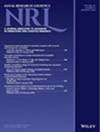Exploring optimal outsourcing strategy with and without transfer payment
IF 2.1
4区 管理学
Q3 OPERATIONS RESEARCH & MANAGEMENT SCIENCE
引用次数: 0
Abstract
This study investigates an original equipment manufacturer's (OEM's) outsourcing choice between a competing manufacturer (CP) and a non‐competing manufacturer (NP). We develop a benchmark self‐produce strategy and two outsourcing strategies to differentiate two manufacturing service providers, and examine the optimal strategy alongside an analysis of the respective incentives (e.g., a lump‐sum payment) from the two service providers. The optimal strategy depends on the difference in production efficiency, degree of product substitution, and joint effect of the transfer payments. The transfer payments contribute to a greater range of Pareto improvements, increasing the possibility of outsourcing cooperation while highlighting the role of competition intensity on the model and outsourcing cooperation partner. Effect analysis shows that in the absence of transfer payment, the optimal strategy is beneficial to social welfare. With transfer payment, the optimal strategy is changed and the firms will be more profitable, but at the expense of customers' surplus, which may result in worse social welfare. An extended analysis of mixed strategies, in which the OEM produces part of the products and outsources the rest to CP/NP, shows that while the mixed‐CP strategy can be an optimal choice, the mixed‐NP strategy will degenerate to either self‐produce or complete outsourcing to NP under certain conditions.探索有无转移支付的最佳外包战略
本研究探讨了原始设备制造商(OEM)在竞争制造商(CP)和非竞争制造商(NP)之间的外包选择。我们制定了一个基准自产策略和两个外包策略,以区分两个制造服务提供商,并在分析两个服务提供商各自的激励措施(如一次性付款)的同时研究最优策略。最佳战略取决于生产效率的差异、产品替代程度以及转移支付的联合效应。转移支付有助于实现更大范围的帕累托改进,增加了外包合作的可能性,同时突出了竞争强度对模型和外包合作伙伴的作用。效果分析表明,在没有转移支付的情况下,最优战略有利于社会福利。在有转移支付的情况下,最优战略发生了变化,企业将获得更多利润,但这是以牺牲客户剩余为代价的,可能会导致社会福利恶化。对混合战略(即原始设备制造商生产部分产品并将其余产品外包给 CP/NP)的扩展分析表明,虽然混合 CP 战略可能是最优选择,但混合 NP 战略在某些条件下会退化为自产自销或完全外包给 NP。
本文章由计算机程序翻译,如有差异,请以英文原文为准。
求助全文
约1分钟内获得全文
求助全文
来源期刊

Naval Research Logistics
管理科学-运筹学与管理科学
CiteScore
4.20
自引率
4.30%
发文量
47
审稿时长
8 months
期刊介绍:
Submissions that are most appropriate for NRL are papers addressing modeling and analysis of problems motivated by real-world applications; major methodological advances in operations research and applied statistics; and expository or survey pieces of lasting value. Areas represented include (but are not limited to) probability, statistics, simulation, optimization, game theory, quality, scheduling, reliability, maintenance, supply chain, decision analysis, and combat models. Special issues devoted to a single topic are published occasionally, and proposals for special issues are welcomed by the Editorial Board.
 求助内容:
求助内容: 应助结果提醒方式:
应助结果提醒方式:


